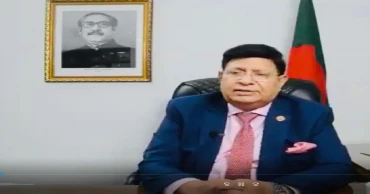Seminar
Moyeen Khan rejects proportional representation system
Strongly opposing the introduction of a proportional representation (PR) system, BNP senior leader Dr Abdul Moyeen Khan on Saturday said it would only strengthen political parties while weakening the link between people and their elected representatives, ultimately causing suffering for the public.
“PR basically weakens the position of an individual representative and strengthens the party instead,” he said while speaking at a seminar.
The seminar, titled ‘Election 2026: A Critical Look at Proportional Representation’, was arranged by Cosmos Foundation, the philanthropic arm of Cosmos Group, at the Cosmos Centre in the capital’s Moghbazar area. United News of Bangladesh (UNB) was the media partner of the event.
Under the PR system, Dr Moyeen, a BNP Standing Committee member, said people would vote for a party, not an individual, and the party would then decide who becomes a member of parliament. “This goes against our fundamental democratic spirit, where people elect their own representatives who are directly accountable to them.”
He warned that making parties stronger while weakening individuals would create a “self-contradictory system,” noting that in Bangladesh, people have always wanted to prevent political parties from becoming too powerful.
“Whenever political parties became too strong in the last 54 years, it ultimately brought suffering for the people,” the BNP leader said.
Dr Moyeen Khan also observed that Bangladeshis are not yet mentally or intellectually prepared for such a complicated electoral process. “People here want a simple system where they can clearly understand who represents them and who they are voting for.”
4 months ago
Bangladesh can’t sustain growth without decentralisation: Experts
Experts at a seminar on Thursday said Bangladesh cannot sustain its development journey without meaningful decentralisation and stronger local government institutions.
The Policy Research Institute of Bangladesh (PRI) hosted the event, the second in its two-part series titled “Can Bangladesh Develop Without Decentralising? – Some Lessons from East Asia and Thoughts on the Local Government Reform and Other Commissions’ Reports”.
PRI Executive Director Dr Khurshid Alam called for inclusive dialogue on strengthening local governance as a cornerstone of broader reforms.
Dr Badiul Alam Majumdar, member of the National Consensus Commission, warned that decentralisation must go hand in hand with political reform.
“If politics continues to operate as a business rather than a public service, honest people will remain reluctant to join it,” he said.
He said principle of subsidiarity—resolving issues at the level closest to citizens—as the guiding motto for reform.
Delivering the keynote, PRI Director Ahsan presented evidence that Bangladesh is among the most centralised countries of its size globally.
He said this structure undermines service delivery in education, health, sanitation, and infrastructure.
Citing East Asian experiences, he argued that well-designed decentralisation—anchored in accountability, transparency, and performance monitoring—is essential for sustained growth.
Bangladesh’s leather sector stuck at $1bn; $5bn could be tapped: Experts
Ahsan endorsed many recommendations of the Local Government Reform Commission but criticised proposals for indirect elections of local government representatives and overlapping jurisdictions, warning these could weaken accountability.
He also urged clarity in fiscal and administrative decentralisation to avoid fragmentation.
Dr M. Masrur Reaz, Chairman and CEO of the Policy Exchange of Bangladesh, highlighted that economic activities remain overly concentrated in Dhaka and Chattogram with Dhaka’s traffic congestion alone causing an estimated $4 billion in annual losses.
He stressed stronger coordination between local and central governments to cut waste and improve public services.
The seminar concluded with a question-and-answer session reaffirming that decentralisation is central to building a more inclusive, accountable, and resilient development model for Bangladesh.
The seminar brought together leading policymakers, economists, and governance specialists to examine how decentralisation could improve public services, reduce economic overconcentration, and make development more inclusive.
5 months ago
Ensure inclusive regional participation in rebuilding Bangladesh: Seminar
Speakers at a regional dialogue in Rajshahi have said that regional participation should be ensured in the country's reconstruction in an inclusive manner.
During the "Dialogue for Democratic Reconstruction" organised by the Centre for Governance Studies (CGS) at Rajshahi Shilpakala Academy on Saturday, the people of the district urged for the inclusion of representatives from all sectors in the governance system to help rebuild the nation and democracy.
Prof of the Department of Accounting and Information Systems and Pro-Vice Chancellor at University of Rajshahi Dr Mohammad Main Uddin, and President of Shujan (Rajshahi district) Ahmed Shafi Uddin were present at the event, moderated by CGS Executive Director Zillur Rahman.
Pesticide use highest in fruits, vegetables in Bangladesh: Seminar
Teachers, students, lawyers, politicians, industrial entrepreneurs, civil society members, media professionals, activists, small business owners, women entrepreneurs, volunteers and professionals from various sectors provided valuable insights on reforms at the event.
Dr Main Uddin emphasised the need for reform or reconstruction in the wake of a nation's systemic collapse, and highlighted that when the system of a nation collapses, reform becomes imperative.
He also focused on the destruction of institutions under the previous regime and noted that the student revolution has opened the door for reform.
He, however, raised a critical question: "Whom will we entrust with the authority to reform after decisions to reform are made?"
Citing the March 7, 1973, election, he criticized those in power for undermining the electoral system by declaring "Bakshal”.
He stressed the importance of ensuring that power does not return to such individuals and called for greater unity in ideology among those involved in the July uprising of Bangladesh.
Ahmed Shafi Uddin proposed that the term "governance" or “regime” be replaced with "good governance."
Seminar highlights challenges and prospects of Bangladesh’s tea industry
He criticised decisions made by the elite class being imposed on 18 million people and underscored the necessity of regional decentralization within the regime system, and recommended opposition parties should build a shadow government to address existing challenges.
Zillur Rahman cautioned against replacing one fascist regime with another, asserting that the leaders of the ‘Freedom Uprising of July’ cannot claim exclusive ownership of the movement.
Addressing calls for immediate reform, he acknowledged the urgency but reminded everyone that "reform is a never-ending process." Whoever holds power must remain accountable to people and open to criticism, he asserted.
BNP Adviser Mizanur Rahman Minu said BNP has already provided 31 points of demands for national reform. "If BNP ever comes to power through national election, they will offer the people of Bangladesh a new country."
He expressed his optimism that no fascist regime will be allowed in the soil of democratic Bangladesh.
Among the participants, a human rights activist highlighted the lack of understanding of human rights among political party leaders.
Seminar highlights urgency of resolving India-Bangladesh river dispute
Previous regimes have been responsible for widespread human rights violations, calling for greater awareness and accountability in this area, urging immediate attention.
A representative of the Jatiya Adivasi Parishad lamented the lack of progress even after 53 years of independence, and called for greater inclusivity and recognition of marginalised groups.
1 year ago
Youth advocates demand stronger tobacco laws
Youth advocates against tobacco on Thursday called for the amendment and strengthening of existing tobacco control laws to protect the health of adolescents and young people.
They made this demand at the conclusion of a training programme titled "Capacity Building Workshop for the Youth Leaders Against Tobacco” held at Nari Maitree’s headquarters in Agargaon, Dhaka. The training was attended by 20 young women.
The programme was chaired by Nari Maitree's Executive Director, Shaheen Akter Dolly, and the special guest was Md. Abdus Salam Mia, Programs Manager of Campaign for Tobacco-Free Kids, Bangladesh.
During the workshop Nasrin Akter, Project Coordinator of Nari Maitree, delivered the main presentation, outlining six key demands included in the draft amendments to the tobacco control law prepared by the Ministry of Health in collaboration with the FCTC.
These are: the elimination of designated smoking areas in all public places and public transport to protect non-smokers; the prohibition of tobacco product displays at sales points to halt tobacco advertising; and the complete ban on the social responsibility activities of tobacco companies. Additionally, it calls for the prohibition of the import, use, and marketing of e-cigarettes or emerging heated tobacco products, the cessation of all forms of retail and loose sales of tobacco products, and the increase of pictorial health warnings from 50% to 90%.
Shaheen Akter Dolly said that tobacco is highly detrimental to the health of women and children as each year, around 38.4 million people in Bangladesh are exposed to second-hand smoke, with women and children being the most affected.
Abdus Salam Mia, Programs Manager of Campaign for Tobacco-Free Kids, Bangladesh, called upon young people to resist the misleading campaigns of tobacco companies, which aim to make tobacco products appealing to youth.
After the enactment of the Tobacco Control Act in 2005, cigarette tax revenue increased by 17.97% in the 2005-06 fiscal year and by 37.52% in 2006-07. Similarly, after the 2013 amendment, revenue rose by 25.51% in 2013-14 and 46.52% in 2014-15.
According to the World Health Organization, both traditional cigarettes and e-cigarettes are equally harmful. Salam Mia urged young people to be vigilant, resist tobacco companies' deceitful activities, and stand firm against their harmful practices.
1 year ago
BTCCI to promote Bangladesh as 'gateway to South Asia' for Thailand
A 50-member trade delegation from Bangladesh will be visiting Thailand to take part in the biggest business-to-business matchmaking seminar to be held in Bangkok on November 30.
The delegation will be led by Abdur Rahim, Additional Secretary to the Ministry of Commerce; Makawadee Sumitmor, Ambassador of Thailand to Bangladesh; and Bangladesh Thai Chamber of Commerce and Industry (BTCCI) President Shams Mahmud.
Bangladesh Thai Chamber of Commerce and Industry along with the Commerce Ministry of Thailand and the Royal Thai Embassy in Dhaka jointly organised this program.
The delegation visit will be the first of a series of planned visits to Thailand by Bangladesh Thai Chamber of Commerce and Industry to make Thailand the gateway for Bangladesh to Southeast Asia and promote Bangladesh as the gateway to South Asia for Thailand, BTCCI said on Tuesday.
Read: BGMEA chief for stepping up economic diplomacy to boost Bangladesh-US trade
A seminar titled “Bangladesh and Thailand: New Horizons for Trade and Investment” will also be held during this time where Dr Masrur Reaz, Chairman of Policy Exchange, will make the keynote presentation.
Over 100 Thai companies will be participating in this event, comprising of agro, beauty and skincare, construction, light engineering, textile, aviation, hospitality, renewable energy, and fisheries sectors.
During this visit, important discussions are expected to take place regarding free trade agreement between Bangladesh and Thailand along with ways to encourage FDI, joint ventures, transfer of technology, and new avenues of cooperation.
Besides this, the delegation leaders will make courtesy calls on Dr. Nalinee Taveesin, Adviser to the Prime Minister and Thailand Trade Representative; Sarun Charoensuwan, Permanent Secretary of the Ministry of Foreign Affairs; and Ekachat Seetavorarat, Deputy Permanent Secretary of the Ministry of Commerce.
Read: BMCCI advocates for business-friendly environment in meeting with deputy governor of central bank
Four factory visits have been arranged to showcase cutting edge technologies in garments and textile, environmental management, construction, light engineering, and agro sectors for the delegation members.
2 years ago
Academic seminar on the occasion of Mother Language Day held in Bangkok
An academic seminar was jointly organized by Kasetsart University and Bangladesh Embassy in Bangkok on Friday at Kasetsart University campus on the occasion of International Mother Language Day 2023.
In the opening ceremony, The Ambassador of Bangladesh to Bangkok Mohammed Abdul Hye was present as a special guest where Dr. Ladawan Puangchit, Vice President (Academic Affairs) of Kasetsart University and Director of Kasetsart University International College and Dr. Buncha Chinnasri, Deputy Director of Kasetsart University International College were also present.
Bangladesh Ambassador to Thailand Mohammed Abdul Hye mentioned in his remarks that the main source of the vocabulary of both Bangla and Thai languages is Sanskrit. The same source of written form-the Brahmi script is used in both the languages.
Therefore, there is ample scope for further comparative research on Bangla and Thai languages, he added.
The Ambassador emphasized on organizing such academic seminars on a regular basis and assured that the Bangladesh Embassy would come forward for such an endeavor with Kasetsart University in the future.
At the outset, the Deputy Director of Kasetsart University International College Dr. Buncha explained the background of this joint venture of Kasetsart University and Bangladesh Embassy in Bangkok.
Moreover, Dr. Puangchit, in her welcome speech, mentioned the ongoing activities between Kasetsart University and the Bangladesh Embassy in Bangkok including specially earmarked scholarships for Bangladeshi graduates in Masters and Post-doctoral programmes.
During the seminar, Dr. Kowit Pimpuang, Associate Professor of Thai Language Department of Kasetsart University, Dr. Sombat Mangmeesukhsiri, Managing Director of the Sanskrit Studies Centre of Silapakorn University and International Mother Language Institute Director General and Dhaka University Communication Disorders department professor Dr. Hakim Arif participated as panelists.
At the end, Maleka Parveen, Minister (Political) and Deputy Head of Mission of the Bangladesh Embassy, expressed her sincere thanks to all the panelists for their enlightening discussions.
3 years ago
Use AI to develop entrepreneurs: Speakers
The Entrepreneur Economist Club of Dhaka School of Economics organized a virtual seminar on the importance of big data and machine learning in entrepreneurship analysis.
Speakers from different countries connected the seminar through online, while the students and faculties of entrepreneurship economics joined the program as hosts, held on Tuesday.
The speakers emphasized increasing practice on machine learning and data analytics, to face the challenges of entrepreneurship in the new era.
There is a possibility of major changes in the economic activities of the country. So any skills in machine learning and data analytics will put an employee ahead, they said.
Read More;: Google's AI Chatbot Bard: All You Need to Know
Prof Parul Khanna, Vice Principal, IMT, Faridabad, India was the chief guest in the seminar while Economist and Coordinator of entrepreneurship economics Professor Dr. Muhammad Mahbub Ali chaired the session.
Prof.Dr.Rinku Sharma Dixit, New Delhi School of Management, India presents a keynote paper on ‘using big data and artificial intelligence to accelerate entrepreneurial development
Dr. Sudipta Bhattacharya, Dr. Dipika Kundal, Dr. Kunal Sheel, Dr. Pranjal Kumar Pukhan, Assistant Professors Rehena Parveen, and Dr. Sara Tasnim, among others, spoke at the function.
Read More: ChatGPT maker releases tool to help teachers detect if AI wrote homework
3 years ago
Speakers for establishing Prophet's ideology in every sphere of life
Speakers at a conference on Sunday underlined the need to establish the ideology of Prophet Mohammed (SM) in every sphere of life.They termed Prophet Mohammed (SM) as the best man ever, saying that those who could fall in his love are the real believers.Bangladesh Ashikane Awlia Parishad organised the Rahmatullil Alamin Conference at Jatiya Press Club to mark the Eid-e-Miladunnabi, the day of birth and demise of prophet.Founder president of the organisation and Pir of Sureshwar Darbar Sharif Alhaj Syed Shah Sufi Belal Noori Al Sureshwari presided over the conference while nuclear scientist Prof Dr M Shamsher Ali spoke in the function as the chief guest.Moderated by senior vice president of Ashikane Awlia Parishad and Sazzadanshin of Sureswar Darbar Sharif Syed Shah Sufi Muktadir Al Noori, the conference was addressed by vice chancellor of Bangladesh University Prof Dr Anisuzzaman, former education secretary Nazrul Islam Khan, former chairman of Madrasha Education Board Prof Dr Md Abu Bakar Siddique, director of Bangla Academy Mufti Dr Md Harun Or Rashid and founder president of Worldwide Human Rights Foundation Prof Dr Emdadul Haque Khan addressed the function as the special guests.
Read: Holy Eid-e-Miladunnabi observed
Speaking as the chief guest, Prof Shamsher Mobin said Muslims are not communal and cannot be communal.He mentioned that the Holy Quran is the book of guidance for the entire mankind and the Prophet (SM) is the mercy of the whole world.Pir of Sureshwar Darbar Sharif Alhaj Syed Shah Sufi Belal Noori Al Sureshwari said, "Love and affection for the Prophet is true faith. Those who love the Prophet are true Muslims."He said that some scholars are reluctant to observe the Eid-e-Miladunnabi (SM) and claim that Miladunnabi did not exist during the era of the Prophet (SM) and his companions (sahabas) - this is not correct. Rather, prophet Mohammed (SM) celebrated the day by fasting.
3 years ago
1971 genocide by Pakistani military most heinous crimes in human history: Momen
Foreign Minister Dr AK Abdul Momen has said Bangladesh genocide committed in 1971 by the Pakistani military is one of the most heinous crimes in human history and regretted that the Bangladesh genocide is yet to be recognised by the international community to the extent the genocide warrants.
“We do not know of another instance of such barbarism of such intensity and mayhem,” Momen said while speaking at a virtual seminar as the chief guest.
The Foreign Minister said on 25 March 1971 the Pakistan junta undertook the cruel and enormous mayhem of innocent civilian people of Bangladesh in order to suppress the nation's democratic aspirations by sheer force of fear and terror.
He informed that Bangladesh declared 25 March as the Genocide Day and Bangladesh is working for getting the date recognized as the International Genocide Day by all the countries in the world.
Foreign Secretary Masud Bin Momenn said 1971 has been the most significant year in the history of Bangladesh.
In one hand, Bangladesh achieved her independence in this very year, on the other hand, the nation experienced the ugliest chapter of brutality, atrocities, indiscriminate killing, raping, looting, and arson to achieve independence, he said, adding that the world witnessed genocide within three decades of the Second World War.
Read: Momen in NY: No specific info given by US on Rab sanctions
The High Commission for Bangladesh in Canada and the Bangabandhu Centre for Bangladesh Studies (BCBS) in Canada, Liberation War Museum, Bangladesh, Genocide Studies Centre, University of Dhaka, Refugees Resilience Centre and Rotary Club Canada jointly organized the day-long seminar on remembering and recognition of the case of Bangladesh Genocide on 1971 at the Human Rights Museum, Winipeg, Canada on September 21.
High Commissioner of Bangladesh to Canada and the Chief Patron of the BCBS in Canada Dr Khalilur Rahman and Dr Kawser Ahmed, Chief Coordinator of the BCBS, Canada, delivered introductory remarks.
Dr. Gregory Stanton of Genocide Watch delivered the keynote speech.
David C Newman, Rotarian and Peace-Builder and Canadian Patron of the BCBS, Dr. James Waller, Cohen Professor of the Holocaust and Genocide Studies of Keene State College, New Hampshire, USA, Dr. Adam Muller, Professor and Director of Peace and Conflict Studies, University of Manitoba, spoke at the seminar.
In addition, Dr. John Adam of University of British Colombia, Vancouver, Canada, gave a verbal illustration of the Bangladesh Genocide which pictures the heinous crimes committed in Bangladesh in 1971.
Joining virtually, Mofidul Hoque, Trustee, Liberation War Museum of Bangladesh, and Director of Centre for the Study of Genocide and Justice explained the case of genocide in Bangladesh in 1971.
His statement was followed by presentations by post-genocide generation researchers.
Professor Dr Imtiaz Ahmed, Director of Center for Genocide Studies, University of Dhaka, presented a paper delineating the Bangladesh genocide.
Professor Ahmed said that the Bangladesh genocide fulfills all criteria declared by the UN to get the global recognition.
Some members of the victim families of the Genocide also spoke at the Seminar.
Professor Dr. Nuzhat Chowdhury described the abduction of her father Dr Alim Chowdhury by collaborators of the Pakistan military, the Rajakars, and his subsequent brutal killing just before the independence of Bangladesh.
Read: Myanmar’s shelling inside Bangladesh “unintentional mistake”, Momen says in NY
She explained the international politics behind the dilemma of getting Bangladesh Genocide recognised and urged for end to such realpolitik.
Dr Towheed Reza Noor, son of Sirajuddin Hossain, described his father's abduction and killing. Martyr Mr. Sirajuddin Hossain was a prominent journalist.
He described how the Bengali intellectuals were made victim of genocide committed by Pakistani military.
Asif Muneir, son of Professor Munir Chowdhury, gave the description of his father's abduction and killing during the Bangladesh Genocide of 1971 by the collaborators of Pakistan military, Rajakar, Al Badr and Al Shams.
3 years ago
24 national armies to work together for regional peace and stability: ISPR
To maintain regional peace and stability, the Armies of twenty-four countries have expressed solidarity to work together.
The 46th Indo-Pacific Armies Management Seminar (IPAMS) - 2022 co-hosted by the Bangladesh Army and US Army Pacific (USARPAC) has come to an end with participants expressing optimism for continued peace and stability in the region.
Delegates from 24 countries headed by senior military leaders attended the seminar held at a city hotel, which was scheduled from September 12-15, said a press release of Inter Services Public Relation (ISPR), signed by its Assistant Director Rashedul Alam Khan on Friday.
“Twenty-four nations came together to share ideas, build relationships, and even express concerns about the security and prosperity of the world’s most consequential region, sending a powerful message of unity and collective commitment,” U.S. Army Pacific’s Gen. Charles A. Flynn told a closing ceremony.
3 years ago



















